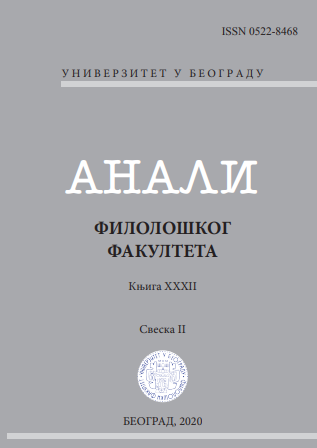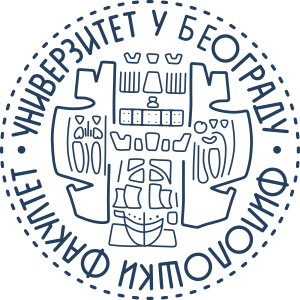Political, Moral, and Existential Nihilism in Wilfred Owen’s Poem “The Dead-Beat”
DOI:
https://doi.org/10.18485/analiff.2020.32.2.3Кључне речи:
Wilfred Owen, the First World War, war poetry, political nihilism, moral nihilism, existential nihilism, irony, dehumanization, alienationАпстракт
This paper analyzes “The Dead-Beat”, a war poem by Wilfred Owen, from the perspective of nihilism, or its three specific kinds (political, moral, and existential nihilism), as Alan Pratt, a theoretician and researcher of nihilistic philosophy, categorized this notion. According to Pratt, political nihilism refers to the idea that current political structures are false, moral nihilism means that good and evil are relative categories, whereas existential nihilism means that human life is intrinsically devoid of any higher (teleological) purpose, and as such not worth living. Through the misfortunate demise of “The Dead-Beat’s” protagonist on the WW1 Western Front, the poet advocates all three kinds of nihilism, for, as the paper argues, the poem’s tragic hero does not die of a wound but as a result of his revelation that the existence of an individual human being or soldier, especially if trapped in the trenches of history’s first mechanized war and abandoned by both his state leadership and his closest kin, is meaningless (and it is precisely in this fact that the presence of political, moral, and existential nihilism lies). This paper views “The Dead-Beat’s” nihilism in contrast with the ideology of materialistic progressivism as propounded by both positivist philosophers and liberal theologians of the nineteenth century. Apart from dealing with the tragic hero’s mental derangement as the cause of his death, I also stress irony as a particular quality of “The Dead-Beat” and also of Owen’s complete poetic war opus.
Downloads
Downloads
Објављено
Број часописа
Рубрика
Лиценца

Овај рад је под Creative Commons Aуторство-Дели под истим условима 4.0 Интернационална лиценца.
Authors who publish with this journal agree to the following terms:
- Authors are confirming that they are the authors of the submitting article, which will be published (print and online) in the journal Anali filološkog fakulteta by the Faculty of Philology, University of Belgrade (Faculty of Philology, Studentski trg 3, 11000 Belgrade, Serbia). Author’s name will be evident in the printed article in the journal. All decisions regarding layout and distribution of the work are in hands of the publisher.
- Authors guarantee that the work is their own original creation and does not infringe any statutory or common-law copyright or any proprietary right of any third party. In case of claims by third parties, authors commit their self to defend the interests of the publisher, and shall cover any potential costs.
- Authors retain copyright and grant the journal right of first publication with the work simultaneously licensed under a Creative Commons Attribution-ShareAlike 4.0 International License that allows others to share the work with an acknowledgement of the work's authorship and initial publication in this journal.
- Authors are able to enter into separate, additional contractual arrangements for the non-exclusive distribution of the journal's published version of the work (e.g., post it to an institutional repository or publish it in a book), with an acknowledgement of its initial publication in this journal.
- Authors are permitted and encouraged to post their work online (e.g., in institutional repositories or on their website) prior to and during the submission process, as it can lead to productive exchanges, as well as earlier and greater citation of published work.





